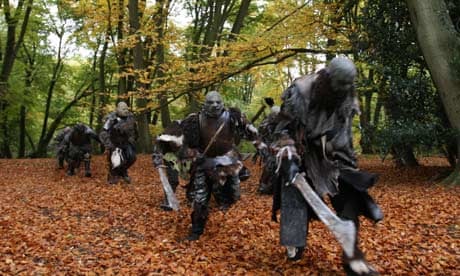The Lord of the Rings might have spawned a thousand pallid imitations, been crowned the UK's best-loved book and sold millions of copies around the world, but according to newly declassified documents, it was damned by the Nobel prize jury on the grounds of JRR Tolkien's second-rate prose.
The mysterious workings of the Nobel committee remain a secret until 50 years after the award is made, when the archive for that year is opened in the Nobel library in Stockholm. Swedish reporter Andreas Ekström delved into 1961's previously classified documents on their release this week, to find the jury passed over names including Lawrence Durrell, Robert Frost, Graham Greene, EM Forster and Tolkien to come up with their eventual winner, Yugoslavian writer Ivo Andrić.
While Andrić was lauded for "the epic force with which he has traced themes and depicted human destinies drawn from the history of his country", other nominated writers received shorter shrift from the Nobel committee, Ekström revealed in Swedish newspaper Sydsvenska Dagbladet.
The prose of Tolkien – who was nominated by his friend and fellow fantasy author CS Lewis – "has not in any way measured up to storytelling of the highest quality", wrote jury member Anders Österling. Frost, on the other hand, was dismissed because of his "advanced age" – he was 86 at the time – with the jury deciding the American poet's years were "a fundamental obstacle, which the committee regretfully found it necessary to state". Forster was also ruled out for his age – a consideration that no longer bothers the jury, which awarded the prize to the 87-year-old Doris Lessing in 2007 – with Österling calling the author "a shadow of his former self, with long lost spiritual health".
Durrell, meanwhile, "gives a dubious aftertaste … because of [his] monomaniacal preoccupation with erotic complications", while Italian novelist Alberto Moravia "suffers from … a general monotony".
Greene, who never won the Nobel, was 1961's runner-up, with Danish writer Karen Blixen, author of Out of Africa, coming in third.
"I have been doing this as a bit of a personal and journalistical tradition the past five years or so, and this was the first time I have seen Tolkien's name among the suggested candidates," said Ekström. "Today, there are usually about 300 suggestions each year – back then, it was more often around 50. Not anyone can suggest a winner. The Swedish Academy invites certain academics, former winners and other institutional representatives to nominate, and can itself of course nominate too.
"The academy keeps a strict secrecy around the archives for 50 years, but doesn't reveal everything. The final decision is made without any notes ever becoming public. But the list of suggestions is indeed public, with some commentary to it. Tolkien was nominated by CS Lewis, that was the first thing I saw … Lewis was a professor of literature, and hence qualified to nominate. However, the short commentary from Anders Österling, the dominant literature critic in the academy, was fairly sour. He basically just said about the [Lord of the Rings] trilogy: 'the result has not in any way measured up to storytelling of the highest quality'. Wham!"

Comments (…)
Sign in or create your Guardian account to join the discussion